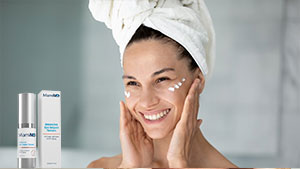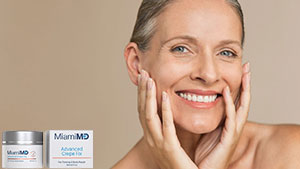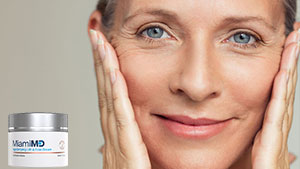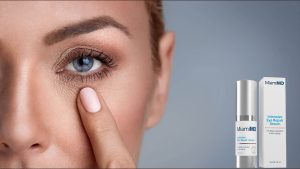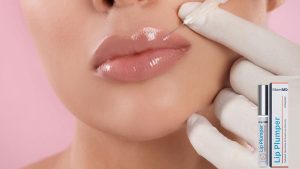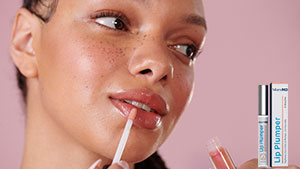What Is Broad Spectrum Sunscreen?

Sunscreen is a must-have for keeping your skin healthy and protected from the sun. But with so many options, it can be hard to know what to look for.
Today, we’ll explore what broad spectrum sunscreen is, how it works, and why it’s important for your skin. Plus, we’ll share tips on choosing the best sunscreen to keep your skin looking youthful and radiant.
What Is Broad Spectrum Sunscreen?
Broad spectrum sunscreen is a type of sunscreen that protects your skin from two types of harmful rays from the sun: UVA and UVB.
While UVB rays can cause sunburn, UVA rays can make your skin age faster, causing wrinkles and fine lines. In fact, one study of 298 white women found that this type of sun exposure may be responsible for up to 80% of visible signs of skin aging (1). The good news is a broad spectrum sunscreen keeps your skin safe from both.
What Is SPF?
SPF stands for sun protection factor. It’s a number that shows how well the sunscreen protects your skin from UV rays. The higher the number, the better the protection. For example, SPF 30 means you’re protected for about 30 times longer than if you weren’t wearing sunscreen.
“I am profoundly for SPF 50. UV light is a known entity that not only causes premature aging but also cancer, and they are both proven without a shadow of a doubt. Both of those things are highly preventable,” says dermatologist Dr. Sam Bunting (2).
How Does Sunscreen Work?
Sunscreen works by either absorbing or reflecting the sun’s harmful rays. It forms a shield on your skin, helping to block the UV rays that can hurt your skin cells. This protection prevents the sun’s rays from penetrating deep into your skin, where they can damage DNA and lead to issues like premature aging, sunburns, and even skin cancer. By creating this barrier, sunscreen allows your skin to stay healthy and resilient, even on the sunniest days.
Chemical vs. Mineral Sunscreen
Chemical sunscreens absorb the UV rays and change them into heat, which is then released from your skin. ” Chemical sunscreens act almost like a sponge, absorbing UV light, while physical sunscreens act more like a shield, deflecting the sun’s rays,” says Dr. Tyler Hollmig (3).
Chemical sunscreens often feel lightweight and blend easily, making them a popular choice for daily use under makeup or during outdoor activities. However, some people with sensitive skin might find certain chemical ingredients irritating.
Mineral sunscreens, on the other hand, sit on top of your skin and reflect the UV rays like a mirror. “ Mineral sunscreens are composed of minerals and protect the skin by reflecting ultraviolet light from the sun,” explains dermatologist Dr. Taylor Bullock (4). They are made with natural active ingredients like zinc oxide or titanium dioxide, which are gentle and ideal for sensitive skin types.
While mineral sunscreens can sometimes leave a white cast, newer formulations are improving to make them more wearable. Both types offer effective sun protection, so the choice depends on your skin type, lifestyle, and personal preferences.
“ Mineral sunscreens offer the most protection because they’re literally creating a physical separation between you and the sun,” says dermatologist Anisha Patel (5). However, some people prefer one over the other based on how it feels on their skin. “Even if it’s not the perfect sunscreen,” she says, “it’s better to wear something rather than nothing.”
What Does Broad Spectrum Sunscreen Do?
Broad spectrum sunscreen keeps your skin safe from both UVA and UVB rays. This means it can help prevent sunburns, aging, and other skin damage. UVA rays penetrate deeper into the skin, leading to wrinkles, fine lines, and loss of elasticity, while UVB rays are the main cause of painful sunburns.
By blocking both types of rays, broad spectrum sunscreen provides comprehensive protection, helping to maintain healthy, youthful skin and reducing the risk of skin cancer over time.
Why Is Sunscreen Important?
There are a handful of key reasons why sunscreen is so important for your skin. Here’s a rundown of what you should know.
Prevent Sun Damage
The sun can cause a lot of harm to your skin if you don’t protect it. Sunscreen helps stop this damage by blocking the harmful rays.
Without protection, UV rays can penetrate deep into your skin, breaking down collagen and elastin, which are essential for keeping your skin firm and smooth. Over time, this damage can lead to fine lines, wrinkles, and even skin cancer.
Applying sunscreen daily is an easy way to shield your skin and keep it healthy. “There’s no simple way to undo sun damage yet. But there are lots of simple ways to prevent it by being sun-safe and avoiding sunburns,” says dermatologist Dr. George (6).
Ward Off Dark Spots
Dark spots, also called sunspots, can form on your skin from too much sun.“The exact reason why dark spots appear ranges from acne scars to excessive sun exposure to aging to nutritional deficiencies. However, most dark spots are a result of sun exposure,” says board-certified dermatologist, Dr. Green (7).
These spots are caused by an overproduction of melanin, the pigment that gives your skin its color, as a response to UV exposure. Using sunscreen regularly can help prevent them from appearing and stop existing spots from getting darker. Consistent protection keeps your skin tone even and reduces the need for treatments to correct discoloration later on.
Maintain a Youthful-Looking Complexion
No one wants to look older than they are. A recent study shows that using sunscreen regularly helps prevent photoaging, which includes wrinkles, dark spots, and loss of skin elasticity caused by the sun’s ultraviolet rays (8). Sunscreen helps slow down the aging process, keeping your skin looking fresh and youthful for longer.
By blocking UVA rays, which are responsible for premature aging, sunscreen prevents the breakdown of collagen and elastin in your skin. These proteins are what give your skin its firmness and elasticity. Regular use of sunscreen can reduce the appearance of wrinkles, fine lines, and sagging, helping you maintain a radiant, youthful glow over time.
What To Look For in a Sunscreen
So, what should you be on the lookout for when you’re picking out sunscreen? There are a couple of things to keep in mind.
Lightweight Formula
A lightweight sunscreen feels more comfortable on your skin. You won’t even notice it’s there, making it easier to wear every day. Lightweight formulas are especially great for layering under makeup, as they won’t feel heavy or clog your pores.
Look for products labeled as “sheer” or “ultra-light” for a barely-there finish that blends seamlessly into your skincare routine. This ensures you’ll be more likely to use it consistently, which is key to protecting your skin.
Non-Greasy
A non-greasy sunscreen is important so your skin doesn’t feel sticky or oily. You want a product that feels good and absorbs quickly. This makes it perfect for all-day wear, especially in warm or humid weather when heavier sunscreens can feel uncomfortable.
Non-greasy options are also less likely to leave a shiny finish, making them ideal for people with oily or combination skin. A matte or satin-finish sunscreen can help you feel fresh and confident throughout the day.
Hydrating Ingredients
Some sunscreens include moisturizing ingredients that keep your skin soft and smooth. Look for sunscreens with hydrating ingredients like aloe or glycerin. These ingredients not only protect your skin from the sun but also prevent it from drying out, which can happen with prolonged sun exposure.
Hyaluronic acid and ceramides are other great additions to look for, as they help lock in moisture and support your skin’s natural barrier. A sunscreen with hydrating ingredients can double as a moisturizer, simplifying your skincare routine.
Added Antioxidants
Antioxidants help protect your skin from damage caused by free radicals, which are harmful particles from the environment. Sunscreens with added antioxidants give your skin an extra boost of protection.
Ingredients like vitamin C, vitamin E, or green tea extract can neutralize free radicals, preventing them from breaking down collagen and causing premature aging. These antioxidants also work to brighten your complexion and repair minor skin damage, making your sunscreen more than just a protective barrier — it’s a skincare multitasker.
The Bottom Line
Using a broad spectrum sunscreen is one of the best things you can do for your skin. It protects you from harmful sun damage, keeps your skin looking young, and helps prevent dark spots. Look for sunscreens that are lightweight, non-greasy, and hydrating for the best results. Remember to apply it every day!
Sources:
-
Effect of the sun on visible clinical signs of aging in Caucasian skin | PMC (nih.gov)
-
5 Key Dos And Don’ts Of Wearing SPF – According To A Dermatologist | Vogue
-
Mineral Sunscreen vs. Chemical Sunscreen: Which One Is Best for You? | CNET
-
Mineral vs. Chemical Sunscreen: Which Is Better? | Cleveland Clinic
-
Is mineral sunscreen better than chemical sunscreen? | MD Anderson Cancer Center
-
What happens to your skin when you get a sunburn | MD Anderson Cancer Center
-
How to Get Rid of Dark Spots on Face, According to Dermatologists | Vogue
